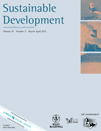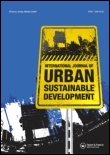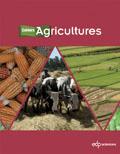
SUSTAINABLE DEVELOPMENT
Scope & Guideline
Driving Innovation in Renewable Solutions
Introduction
Aims and Scopes
- Sustainable Agricultural Practices:
The journal explores innovative agricultural practices that enhance sustainability, including crop diversification, agroecology, and integrated crop-livestock systems, providing insights into methods that improve productivity while conserving resources. - Impact Assessment and Modeling:
Papers often employ modeling and assessment frameworks to evaluate the ecological and socio-economic impacts of agricultural systems, including life cycle assessments and sustainability metrics. - Climate Change Adaptation:
Research contributes to understanding how agricultural systems can adapt to climate change, focusing on resilience strategies, resource management, and the role of technology in mitigating climate impacts. - Biodiversity and Ecosystem Services:
The journal highlights the importance of biodiversity in agricultural systems and its contribution to ecosystem services, promoting practices that enhance ecological health and farming productivity. - Socio-Economic Dimensions:
The journal addresses socio-economic factors influencing the adoption of sustainable practices, assessing farmer well-being, community engagement, and the role of policies in supporting sustainable development.
Trending and Emerging
- Agroecological Innovations:
There is a rising interest in agroecological practices, focusing on systems that enhance biodiversity, promote ecological balance, and improve resilience to climate change. - Digital Agriculture and Technology:
The integration of digital tools and technologies in agriculture is gaining momentum, with studies exploring the role of data analytics, machine learning, and IoT in optimizing agricultural practices. - Soil Health and Management:
Recent research emphasizes soil health as a critical component of sustainable agriculture, highlighting practices that enhance soil quality, carbon sequestration, and nutrient management. - Water Management Strategies:
Emerging themes include innovative water management techniques that address water scarcity and improve efficiency in irrigation practices, particularly in arid regions. - Farmer-Centric Approaches:
There is a growing focus on understanding farmers' perspectives and participatory approaches, recognizing the importance of local knowledge and community engagement in driving sustainable practices.
Declining or Waning
- Conventional Chemical Agriculture:
There is a noticeable decrease in studies focused on conventional chemical agriculture practices, as the field shifts towards more sustainable and organic methodologies. - Single Crop Systems:
Research on single crop systems is waning, with a growing emphasis on diversification and integrated approaches that promote ecological balance and resilience. - Traditional Fertilization Techniques:
The exploration of traditional fertilization methods is declining, as newer and more sustainable techniques, such as organic amendments and precision agriculture, gain traction. - Static Agricultural Policies:
There is less focus on static agricultural policies that do not adapt to changing environmental and socio-economic contexts, as the journal leans towards discussions on dynamic and adaptive policy frameworks. - Pesticide Dependency:
Research specifically centered on pesticide dependency is diminishing, with a shift towards integrated pest management and alternative pest control strategies that align with sustainable practices.
Similar Journals

Agronomy-Basel
Fostering Collaboration in Crop Management and SustainabilityAgronomy-Basel is a leading international journal dedicated to advancing the field of agronomy and crop science, published by the respected MDPI. Since its inception in 2011, this open-access journal has provided a vital platform for the dissemination of high-quality research, featuring innovative studies and reviews that contribute to the understanding of agricultural practices and crop management. With an impressive impact factor and ranked in the Q1 quartile of its category for 2023, Agronomy-Basel has established itself as a premier resource in the realm of Agricultural and Biological Sciences, achieving a commendable rank of #62 out of 406 in its field, placing it in the 84th percentile. The journal targets researchers, professionals, and students who are dedicated to enhancing agricultural sustainability and productivity. Located in Basel, Switzerland, the journal's commitment to open access empowers global accessibility to flourishing agricultural advancements, thus fostering collaboration and innovation across the globe.

International Journal of Urban Sustainable Development
Transforming cities for a sustainable tomorrow.The International Journal of Urban Sustainable Development is a premier peer-reviewed journal published by Taylor & Francis Ltd, dedicated to advancing knowledge in the field of urban sustainability. With an ISSN of 1946-3138 and an E-ISSN of 1946-3146, this journal has gained recognition for its high-quality research, attaining Q1 status in multiple categories including Development, Geography, Planning and Development, and Urban Studies, per the 2023 category quartiles. Open Access since 2022, the journal ensures that groundbreaking research is widely accessible to scholars, practitioners, and policy-makers alike, enhancing its reach and impact. Operating from the United Kingdom, it focuses on a diverse array of topics related to urban environments and sustainable practices, supporting innovation and policy development. As a result, the journal holds significant placements in Scopus rankings, notably ranking #62 in Urban Studies, underscoring its pivotal role in shaping the future of sustainable urban development globally.

AGRICULTURAL SYSTEMS
Cultivating knowledge for a thriving agricultural ecosystem.AGRICULTURAL SYSTEMS, published by Elsevier Science Ltd, is a premier academic journal that serves as a leading platform for innovative research in the fields of agronomy, animal science, and related biological sciences. With a prestigious impact factor reflected in its Q1 ranking in both Agronomy and Crop Science, as well as Animal Science and Zoology, the journal showcases cutting-edge studies and developments from 1976 through 2024. Located in the United Kingdom, the journal features a robust selection of articles that emphasize the integration of agricultural systems, enhancing global agricultural productivity and sustainability. Although it does not currently offer open access options, AGRICULTURAL SYSTEMS maintains an excellent reputation amongst scholars, epitomized by its high rankings in Scopus, placing it in the top 1% of journals in its categories. This makes it an essential resource for researchers, professionals, and students dedicated to advancing knowledge and practice within the agricultural sector.

CABI Agriculture & Bioscience
Unleashing the potential of open access in bioscience.CABI Agriculture & Bioscience is an esteemed international journal published by SpringerNature, dedicated to advancing the fields of Agricultural and Biological Sciences, Animal Science, and Horticulture. With a strong focus on promoting Open Access research since 2020, this journal aims to disseminate scientific knowledge and innovative findings that contribute to sustainable agricultural practices and bioscience advancements. Situated in the United Kingdom, it has rapidly established itself as a premier platform, achieving impressive Q1 rankings in multiple categories, including Agricultural and Biological Sciences and Horticulture, as well as being among the top tier in Food Science. Its exceptional standing—reflected in its Scopus rankings, where it ranks in the 88th and 86th percentiles in key fields—underscores its importance to researchers, professionals, and students alike, fostering an environment for impactful collaboration and growth in the biosciences. By offering Open Access options, CABI Agriculture & Bioscience ensures that vital research is available to a broad audience, facilitating increased visibility and engagement within the global scientific community.

Agrociencia Uruguay
Empowering Research, Cultivating InnovationAgrociencia Uruguay, published by the Universidad de la República, Facultad de Agronomía, serves as a vital academic platform in the field of agricultural and biological sciences. Since its inception in 1997, this Open Access journal has fostered the dissemination of innovative research findings, promoting collaboration among researchers, professionals, and students interested in agronomy, crop science, soil science, and plant science. Operating from Montevideo, Uruguay, the journal strives to address contemporary challenges in agriculture through the publication of high-quality, peer-reviewed articles. Despite its relatively modest impact factors and rankings in Scopus, positioned in the lower percentiles, Agrociencia Uruguay remains crucial for advancing local and regional agricultural knowledge, thus contributing to global food security and sustainable practices. Researchers are encouraged to engage with the journal's content to further enhance their understanding and explore the rich agricultural landscape of Uruguay and beyond.

Agronomy for Sustainable Development
Driving Change in Agronomy for a Sustainable WorldAgronomy for Sustainable Development, published by SPRINGER FRANCE, is a leading international journal dedicated to advancing the field of agronomy and sustainable practices. With its ISSN 1774-0746 and e-ISSN 1773-0155, this esteemed journal plays a pivotal role in disseminating cutting-edge research and innovative solutions that address critical challenges in agriculture and environmental engineering. Achieving remarkable rankings in Scopus—specifically, 19th out of 406 in Agronomy and Crop Science and 22nd out of 197 in Environmental Engineering—underscores its prestige, with a remarkable 95th and 89th percentile respectively. The journal is open access, promoting broader dissemination of knowledge, and welcomes contributions that foster sustainable agricultural practices and enhance environmental stewardship. As an essential resource for researchers, professionals, and students, Agronomy for Sustainable Development serves as a platform for interdisciplinary collaboration aimed at nurturing resilient agricultural systems and promoting sustainability worldwide.

International Journal of Plant Production
Exploring breakthroughs in agriculture and ecological sustainability.International Journal of Plant Production, published by SPRINGER in Switzerland, serves as a leading platform for the dissemination of innovative research in the fields of Agronomy, Crop Science, and Plant Science. With an ISSN of 1735-6814 and an E-ISSN of 1735-8043, this journal has maintained its reputation by achieving a Q2 quartile ranking in both categories as of 2023, alongside notable Scopus rankings placing it in the top quartiles of its fields (Rank #105/516 and Rank #88/406, respectively). The journal's scope encompasses a wide array of topics vital to sustainable agriculture and plant production systems, making it a critical resource for researchers, professionals, and students striving for advancements in these disciplines. By fostering open scientific dialogue and supporting cutting-edge research, the International Journal of Plant Production is committed to contributing to the resolution of global food security challenges, enhancing agricultural practices, and promoting ecological sustainability.

CAHIERS AGRICULTURES
Advancing sustainable agriculture through open knowledge.CAHIERS AGRICULTURES is a distinguished open-access journal published by EDP Sciences S A, focusing on the vital fields of Agronomy and Crop Science, Animal Science and Zoology, as well as Management, Monitoring, Policy, and Law. With an ISSN of 1166-7699 and an E-ISSN of 1777-5949, this journal has notably maintained a strong presence in the academic landscape since its establishment, covering a wide range of topics pertinent to agricultural sciences. Based in France, CAHIERS AGRICULTURES fosters collaboration and knowledge sharing among researchers and practitioners through its open-access model, which has been in effect since 2014. The journal is recognized for its rigorous peer-review process, reflected in its competitive Scopus rankings, which place it in the Q2 quartile for both Agronomy and Crop Science, and Animal Science and Zoology. Researchers and scholars are encouraged to contribute cutting-edge findings that may influence agricultural practices and policy development. With a vision to advance sustainable agricultural practices, CAHIERS AGRICULTURES stands as a critical resource for advancing scientific knowledge and informing stakeholders in the agricultural sector.

Smart Agricultural Technology
Driving Agricultural Excellence with Intelligent SolutionsSmart Agricultural Technology, an esteemed journal published by ELSEVIER, stands at the forefront of agricultural innovation, with its focus on the intersection of cutting-edge technology and sustainable farming practices. Established in 2021, this Open Access journal is committed to disseminating pivotal research findings in the fields of Agricultural and Biological Sciences, Artificial Intelligence, and Computer Science, ensuring that crucial developments are accessible to all stakeholders. With a notable impact factor denoted by its impressive Q1 and Q2 categorizations, Smart Agricultural Technology ranks among the top journals in its fields, boasting a percentile standing of 76th in Agricultural and Biological Sciences and 68th in Computer Science advancements. Operating out of the Netherlands, the journal offers a dynamic platform for researchers, professionals, and students to explore, share, and drive forward the agenda of smart agriculture through vital interdisciplinary collaboration and knowledge dissemination. Featured in Scopus, it promises not only rigor and excellence but also a vibrant forum for groundbreaking ideas and practices that can transform the agricultural landscape.

JOURNAL OF THE FACULTY OF AGRICULTURE KYUSHU UNIVERSITY
Cultivating Knowledge for Sustainable GrowthJOURNAL OF THE FACULTY OF AGRICULTURE KYUSHU UNIVERSITY is a reputable academic journal dedicated to advancing knowledge in the fields of agriculture and biological sciences. Published by Kyushu University, Faculty Agricultural Publications, this journal serves as a platform for researchers and professionals to share original research, innovative methodologies, and critical reviews that focus on biochemistry, genetics, molecular biology, as well as agronomy and crop science. Although the journal's coverage in Scopus has been discontinued as of 2020, it continues to hold significance within the academic community, evidenced by its rankings in the 20th percentile for significant categories. The journal welcomes contributions that push the boundaries of current agricultural practices and enhance sustainable development in the field. Researchers and students seeking to enrich their understanding of agricultural sciences will find invaluable insights and diverse perspectives within its pages. The journal’s commitment to fostering scientific dialogue remains clear, as it continues to be an integral resource for the agricultural academia landscape in Japan and beyond.